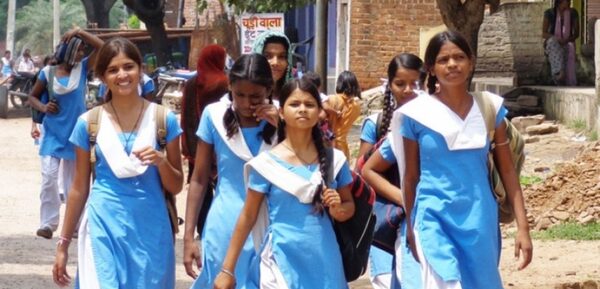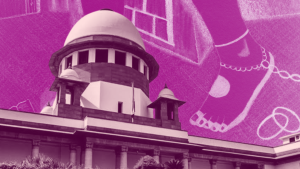Concerns of Raising The Age Of Marriage

In February 2020, the Finance Minister of India Nirmala Sitharaman announced a new proposal to raise the legal age of marriage from 18 to 21. A task force led by Jaya Jaitley was set up to examine, among other things such as improving maternal mortality ratio (MMR) and improving educational outcomes for women and girls , the feasibility of raising the age of marriage. Age of marriage in India was was raised from 15 to 18 by amending the Child Marriage Restraint Act, popularly known as the Sharda Act (1929) in 1978.
“There are imperatives of lowering MMR as well as improvement of nutrition levels. Entire issue about the age of a girl entering motherhood needs to be seen in this light”, said Smriti Irani,the Union Minister of Women and Child Development about the objectives of the task force and links between marriage and women’s health outcomes.
What seems like a progressive step,the proposal has sparked a new debate about the utility of raising the age of marriage in the light of available data and the existing realities of implementation issues of enforcing the law on the current age of marriage.
Criminalising Marginalised Women
Raising the age of marriage to 21 will criminalise women especially from the marginalised and poorest sections of the population, say feminist activitsts in their written submission to the Task Force. Data from the National Family Health Survey-4 (2015-2016) suggest that 56% of women in India and as many as 75% of women amongst the poorest 20% of the population marry between the ages of 20-24 in India. With the new law, they stand to be criminalised.
Besides, more women in India are marrying later than before. Data from NFHS also revealed that 27% of women married before the legal age of 18, an improvement from 47% in a decade since the last round of survey.
Only 6.6% girls married at the age of 15, while 48% women married at the age of 20.
The bigger concern, according to activists working on the issue of child marriages was the tardiness in the implementation of the existing legal age of marriage.
“Child marriages continue to take place even when the legal age of marriage is 18. How will raising the age of marriage make a difference?” asked Mamta Jangrid, an activist working in villages in Ajmer, Rajasthan in a press release hosted by the Young Voices: National Working Group on 24th August 2020
“Marriage in my villages is not determined by age. Girls are married off when they begin to mature. Instead we should look at making those who participate in these kinds of activities accountable”, she added.
“We are convincing girls to wait till they are 18 with a lot of difficulty. Raising the age of marriage will not change this”, said Priyanka Murmu, an activist working in the district of Saraikela in Jharkhand
However, the law does play an important part but it needs to be enforced with stringency.
Raising the legal age of marriage will also risk the loss of rights and entitlements of young widows who are already vulnerable.
“We just recently worked on a case in Karnataka where a woman who was seeking support after the death of her husband was told that her marriage was no longer legal. Raising the legal age of marriage will further add to this issue” , said Madhu Mehra, a feminist lawyer and researcher and member of Partners in Law and Development.
Criminalising Consenting Couples
There are concerns about the proposed legal reform bringing greater harm to young consenting couples instead of preventing child marriages.
Studies show that parents primarily used existing laws to annul marriages that were self arranged by young couples. These range from nullification and punishment under Prohibition of Child Marriage Act (PCMA), for rape and kidnapping under Protection of Children from Sexual Offences (POCSO) Act and the Indian Penal Code (IPC) and Habeas Corpus to get their daughter back. Parents of young girls have used Acts such as Protection of Children from Sexual Offences (POCSO) act, to punish and imprison boys even in the scenario even when it has been consensual
“Women are sexual beings and after a certain age would want to exercise their agency in the choice of their partner. By extending the legal marriage age, it will give parents more control over their daughters’s decision making and we are criminalising a woman’s choice. Now elopements until 21 years will be criminalised”, said Mehra.
“Who needs honour killings, when you can use the law?”, asked Mehra.
Maternal Health Outcomes Linked to Poverty Not Marriage
Early marriages and its linkages to fertility, women and child health is one of the driving forces behind the proposal to raise the age of marriage. However, such health outcomes are related to poverty rather than age of marriage alone, say activists.
“Globally, the legal age of marriage for a woman is 18. This is because biologically her body has matured and her reproductive systems are fully developed.” said Mehra in the webinar.
Data from NFHS also show that women giving birth between the ages of 15 and 19 had declined to 16% to 8% in the decade between 2005 and 2015.
There is now a greater awareness of the links between woman’s health and nutrition and impact on the baby. So even in families, where women are treated less than equal, there is greater emphasis on nutrition during pregnancy”, said Jangid.
Invest In Education And Employment
“Instead of focusing on age, the Government should focus on educating children, especially girls. When girls are trying to study, parents or people in the village are asking what is the point? This is because there are no job opportunities in rural areas especially for women.”
Data from the National Family Health Survey (NFHS-4) suggests that women who have studied for 12 years of schooling are more likely to marry later in life in comparison to women who have been forced out of schooling.
“Instead of focusing on the age of girls, we need to focus on giving women opportunities to earn and become independent by becoming teachers or health workers in the area” adds Priyanka
Policies and schemes such as Kishori Shakti Yojana and Sabala to improve the nutrition, health and development, skills and vocation of adolescent girls should be made universal, instead of marriage focussed schemes like Kanyashree, Rajsree, Shaadi Mubarak, say activists.
Why the urgency to raise the age during the pandemic?
As the pandemic rages in the country, activists predict a rise in the number of child marriages due to a rise in joblessness and increase in school dropout rates of girls. Many states such as Maharashtra have already reported a rise in incidences of child marriage. Authorities in the state have reportedly stopped 100 child weddings between April- July 2020. Maharashtra is considering reopening residential schools as a means to tackle this rise in child marriage, an official in the state told Reuters
“A lot of work on child marriage was always a combination of keeping schools up and running and keeping girls in schools,” said Puja Marwaha, head of the non-profit Child Rights and You to Reuters.
Instead of focusing on the age at which the girl is getting married, our legislatures should be directed towards improving the quality of life of women, especially in the rural context by providing more opportunities for education, jobs and agency in independent decision making, wrote civil society groups and activists in their memorandum to the Task Force.
[Nikita Chatterjee is currently doing Masters in Development Studies from Azim Premji University. She has a keen interest in writing on social movements in rural India]
We believe everyone deserves equal access to accurate news. Support from our readers enables us to keep our journalism open and free for everyone, all over the world.




